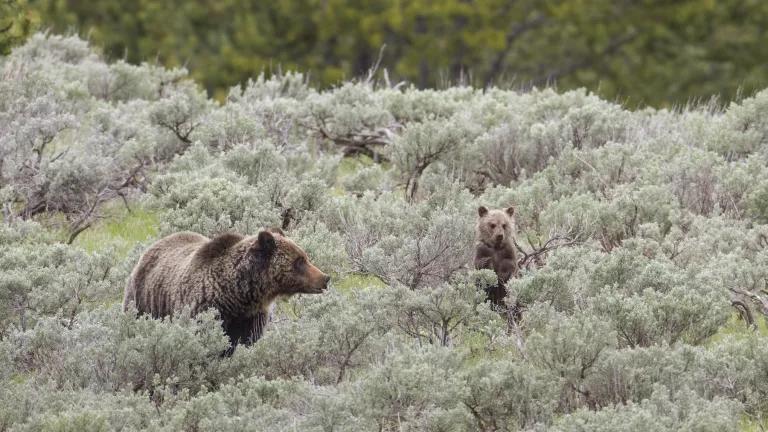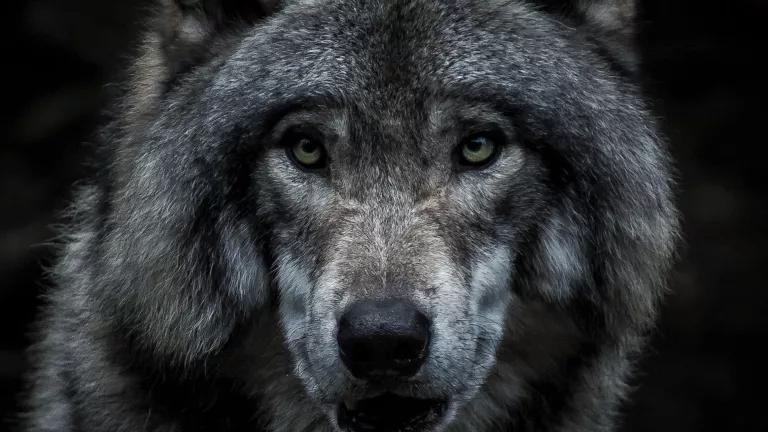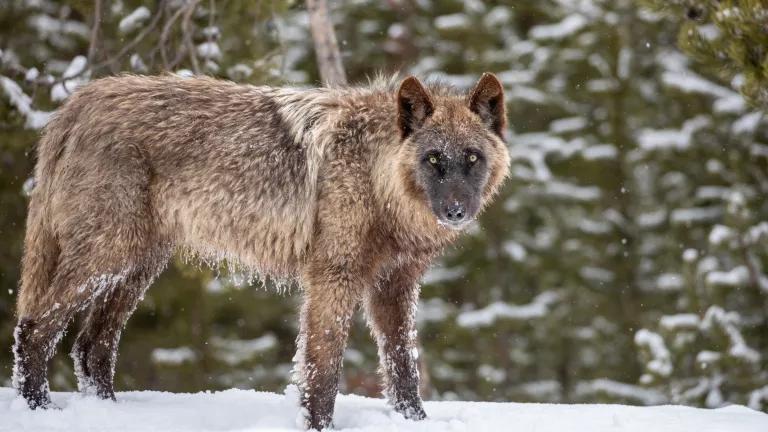MT Rehashes Old Wildlife Debates Instead of Looking Forward
Montana's leaders demonstrate disregard for ethics, modern hunting principles, and professional input on wildlife management.

Governor Gianforte recently trapped and shot an adult black wolf from Yellowstone, like the one pictured here.
Update: During his first full month in office, Montana’s new governor, Greg Gianforte, violated state regulation by failing to complete a mandatory certification course prior to trapping wolves. Gianforte trapped and shot a collared Yellowstone wolf near the park boundary on February 15. This controversial act is a blow to Montana's reputation, to the scientists who study park wolves, and to the many tourists that flock to Montana and Yellowstone. News of the Governor flouting his own state's regulations comes as the Montana Legislature is busy passing unethical and unscientific bills to expand the killing of wolves and other wildlife in the state. Governor Gianforte has the opportunity to change course in Montana and demonstrate that he believes in ethical wildlife management by vetoing the anti-wildlife bills coming out of the Legislature.
The fate of Montana’s iconic wildlife has recently fallen into the hands of conservative state legislators—emboldened by Governor Gianforte—who have set their sights on wolves, bears and bison. A slew of wildlife-killing bills have been introduced in the 2021 State Legislature. These tarnish the reputation of Montanans, who are largely united in their conservation mindset and generally support protections for land, water and wildlife. If passed, these bills will pull Montana backwards, towards its embarrassing legacy of exterminating native species for sport and spite. This legislative session is a crash course in how political decisions driven by special interest pressures, time constraints and emotion can imperil decades of sound, slow, science-based progress in wildlife conservation and policy.

Cowboys rope and surround a wolf in 1887, when anti-wolf hysteria culminated in an aggressive wolf extermination campaign.
Misguided and unethical wildlife bills abound. Their cumulative impact will be a dramatically altered approach to wildlife management in Montana—one rife with misinformation and unjustified malice towards target species. Just to name a few:
- Senate Bill 267 resurrects a wolf bounty system in Montana in an attempt to increase wolf hunting and trapping by offering monetary incentive.
- House Bill 224 allows wolf snaring—a cruel and indiscriminate method that would kill all kinds of wildlife, as well as pet dogs.
- Senate Bill 314 instructs the wildlife Commission to reduce the wolf population by allowing for the use of tools like baits, snares, nighttime hunting, and unlimited caps on wolf killing.
- House Bill 468 allows black bears to be hunted and chased by hounds throughout most of their waking life outside of hibernation. Hounds might unknowingly go after grizzly bears as well.
- Senate Bill 98 allows individuals to kill a grizzly bear that they perceive to be "threatening" livestock—a confusing revision that could mislead Montanans to kill bears in violation of federal laws that continue to protect threatened grizzlies.
- House Bill 302 takes authority away from state wildlife professionals by giving county commissions the power to decide whether or not wild bison can be relocated or translocated in their counties.

Grizzly bears in the lower 48 states remain federally protected under the Endangered Species Act. Still, human-bear conflicts are a major source of bear mortality.
The justifications put forth for these bills cannot be vetted without familiarity of historical context and scientific literature on relevant topics such as predator-prey dynamics, grizzly bear mortality, or the risk of disease transmission between bison and livestock. Montana has a citizen legislature—meaning most maintain regular full-time professions while also serving their state. The rapid-fire legislative schedule rarely grants legislators the time to thoroughly evaluate evidence and explore the real-world impacts of their votes. At times, it's clear that committee members are casting votes without reading a bill, or even attending the bill hearing. This is why the details of wildlife management should be left in the hands of wildlife professionals. Still, Montana’s 2021 legislature marches forward with bills that co-opt expert authority, leading to decisions driven by an extreme vocal minority who hold political influence.
As a society, we decided long ago that we wanted to repair the damage done through short-sighted wildlife extermination campaigns and we are still working hard to put the pieces of the broken ecosystems back together. Montanans from all walks of life have helped to save space for wildlife, and in doing so, branded Montana as one of the last best places to walk amongst the full range of charismatic megafauna that belong to the North American landscape.

The Gibbon gray wolf pack standing in the snow, Yellowstone National Park.
Instead of working to rally Montanans together around our shared environmental values, conservative legislators are busy stoking conflict, fear and divisiveness. Instead of working to protect human and ecosystem health in the midst of a pandemic, a biodiversity crisis and a climate crisis, conservative legislators are focused on rehashing old debates over bounties, baits, snares, and vigilante-style management of wolves, bears, and bison. In the face of great challenge and great change, Montanans need leaders who will unite us with forward momentum, not return us to a distant past.
These bad wildlife bills are passing through the legislature and there is one last chance for Montana's new Governor Greg Gianforte to do the right thing. He should veto these bills to demonstrate to the nation and world that Montana supports ethical wildlife management based on modern, scientific principles.
Ask Gianforte to veto the bills listed above by calling his office at 406-444-3111 or leaving a comment at https://svc.mt.gov/gov/contact/shareopinion.



